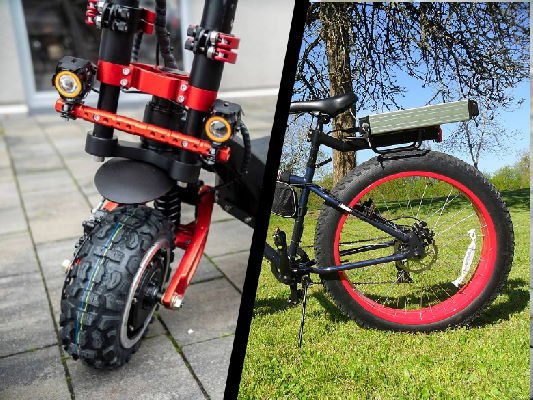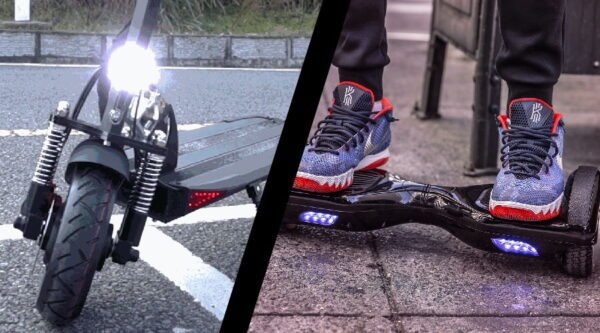Are electric scooters good for the environment? Let’s delve into their eco-impact to find out the truth.

Are electric scooters good for the environment?
Electric scooters are generally great for the environment, as their use doesn’t result in greenhouse-gas emissions. They are energy-efficient and they reduce the need for cars and public transport, which clears up traffic jams and further helps reduce pollution. The only environmental problem they may cause is from the manufacturing and improper disposal of batteries.

Electric scooter environmental impact
Electric scooters have a mixed impact on the environment.
People ask all the time why are electric scooters good for the environment, but never think about the downsides.
They are generally a net positive by directly reducing greenhouse gas emissions, as they don’t rely on fossil fuels and decrease the need for such vehicles, providing a double benefit.
Electric scooters are highly energy-efficient, with low charging costs, even in countries with expensive electricity.
Electricity production, typically having a smaller carbon footprint than burning fossil fuels, further contributes to their eco-friendliness.
However, there are environmental concerns to consider.
Electric scooters use lithium batteries, and while cleaner than oil extraction, their exact environmental impact is still being studied.
The biggest downside of electric scooters is the battery. Inadequate disposal is another issue, but educating users about battery recycling can significantly mitigate this problem.
Eco-friendly scooter
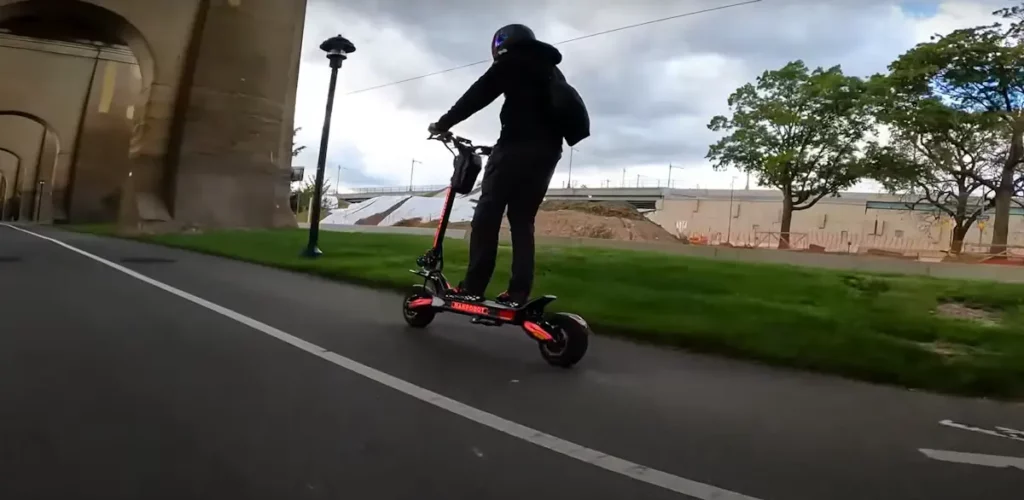
An eco-friendly scooter is designed for sustainability and offers a green alternative to traditional vehicles.
They produce minimal greenhouse gas emissions, enhance energy efficiency, and reduce traffic congestion and air pollution. Lightweight and energy-efficient, they promote solo transportation and a cleaner, more sustainable urban environment.
Ideal for eco-conscious individuals and cities prioritizing clean mobility.
Electricity vs fossil fuel
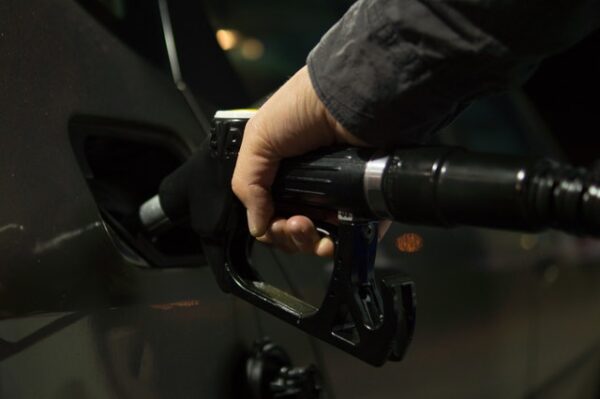
Electric scooters were created to be fossil-fuel-free from the start, which accelerated their popularity.
Unlike cars, trucks, buses, and motorcycles primarily powered by gasoline, electric scooters don’t emit greenhouse gases.
Billions of vehicles worldwide pose a significant threat to our planet, accounting for approximately one-fifth of all emissions.
On average, each vehicle emits 404 grams of CO2 per mile, along with other, more potent greenhouse gases like methane and nitrogen oxide.
Since electric scooters run on rechargeable batteries, they will never release greenhouse gases.
I have lived in a busy city for years, witnessing the problems caused by traffic and pollution. I used to drive a gas car every day, unaware of its contribution to CO2 emissions.
The city often had traffic jams, making air quality worse. Then I decided to change and switch to an electric scooter, and the difference was clear.
Using an electric scooter instead of a car removes one vehicle from traffic, cutting 400 grams of CO2 per mile. Urban areas with scooter-sharing apps often quickly observe reduced carbon monoxide levels, typically within a few months.
Reduction in pollution from traffic jams

Traffic causes pollution, but did you know that traffic jams cause more pollution than usual?
Slower traffic leads to increased pollution.
Cars burn the most fuel during acceleration, especially from a standstill. The same is true when slowing down; extra fuel is consumed and more pollutants are emitted when braking.
Electric scooters avoid traffic jams due to their small size. They don’t get stuck in congestion, and they also alleviate traffic by reducing the number of cars on the road.
Electric scooter efficiency
Burning fuel releases energy faster than batteries, but cars are large and consume most of this energy for self-transport.
Electric scooters rarely weigh more than a dozen kilograms. They only need to carry one person’s weight. Motor vehicles have their uses, and we won’t stop using them soon.
However, the major efficiency and pollution issues arise from solo car trips. Electric scooters can be much more efficient in this regard.
Many scooters today have amazing ranges. Some can travel hundreds of kilometers on one charge; electric scooters excel at solo transportation.
To calculate your potential car commute savings with an electric scooter, check the car commute cost calculator.
Cities that support electric rideables are cleaner
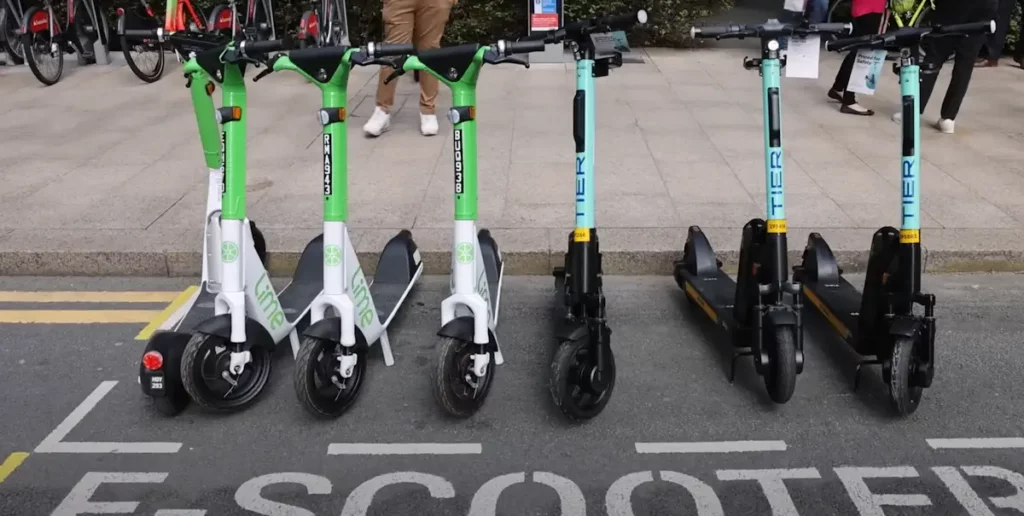
Many cities globally have excellent bike infrastructures, particularly in Western and Northern Europe, which have promoted cycling for years.
These cities readily embrace electric scooters, which are found to be even more efficient than bikes, further reducing traffic congestion and pollution. While bikes offer convenience and many advantages, electric scooters have unique benefits.
People will continue to use them for a long time, but electric scooters are a better way of transport than bikes.
In these cities, the transition is seamless as the existing bike lanes are well-suited for electric scooters, and riders make the most of it.
Despite large populations, they remain some of the greenest and cleanest cities.
Electric scooter downsides
Electric scooters are still consumer products, they still have downsides, and their usage still requires energy. That ultimately ends up with at least some form of waste.
There has been a series of articles suggesting that electric scooters are not eco-friendly at all.
When reviewing these studies and their cited research, a notable flaw in the methodology becomes evident. The approach to calculating scooter pollution is unusual, encompassing emissions from the entire manufacturing process.
In contrast, conventional car pollution assessments solely focus on emissions from the vehicles themselves, much like bicycles and other modes of transportation.
Electric scooters are environmentally favorable due to their absence of emissions, but they do have unique drawbacks, notably related to battery disposal.
Public awareness of proper battery disposal remains a significant challenge.
Electric scooters derive their power from diverse sources, but regardless of the method, they are cleaner than fossil fuel vehicles.
Cleaner electricity generation, such as solar and alternative sources, further enhances their eco-friendliness. The environmental impact of power plants, like those burning coal, is beyond the scope of electric scooter usage.
Given their energy efficiency, the electricity cost of charging electric scooters is minimal, making the productivity gains well worth the few kilowatt-hours expended.
What is the proper way to dispose of electric scooter batteries?

Battery disposal methods depend on your location and government regulations.
Recycling batteries is a straightforward and environmentally responsible choice when supported by local authorities, as improper disposal can harm the environment, yet many battery components can be reused.
Are electric scooters the future?
We can be certain of one thing – battery-powered vehicles are here to stay.
Electric cars are likely the driving force behind advancing battery technology.
In the last five years, they have made significant progress. To track the electric scooter’s evolution over the past two centuries, check out my guide on the history of the electric scooter
Tesla models now rival gas-powered cars in all performance aspects, including speed and range. This bodes well for electric scooters, which benefit from advancements in battery technology.
Ultimately, humanity wins by reducing reliance on fossil fuels, leading to a cleaner environment.



